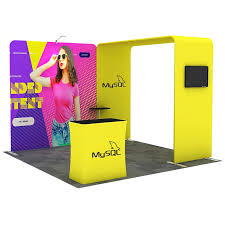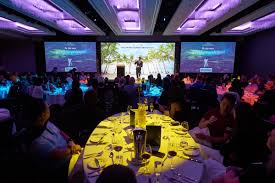The Power of Trade Show Promotional Products
Trade shows are a fantastic opportunity for businesses to showcase their products and services to a targeted audience. One effective way to make a lasting impression at trade shows is through the use of promotional products.
Promotional products serve as tangible reminders of your brand long after the trade show is over. They can help increase brand awareness, generate leads, and foster customer loyalty. When attendees use or see your promotional products, they are reminded of your company and the positive experience they had at your booth.
When selecting trade show promotional products, it’s important to choose items that are useful, relevant to your industry, and reflect your brand identity. Popular options include branded pens, tote bags, water bottles, USB drives, and apparel.
Remember to customize your promotional products with your company logo, colors, and messaging to ensure they effectively promote your brand. Additionally, consider offering exclusive discounts or promotions when attendees visit your booth and receive a promotional product.
In conclusion, trade show promotional products are a powerful marketing tool that can help drive traffic to your booth, engage attendees, and leave a lasting impression. By incorporating well-chosen promotional products into your trade show strategy, you can increase brand visibility and attract potential customers.
Maximize Trade Show Success: 8 Benefits of Using Promotional Products
- Increase brand visibility among a targeted audience
- Create lasting brand impressions with tangible items
- Generate leads and potential customers for future business
- Enhance brand recognition and recall post-trade show
- Drive traffic to your booth and increase engagement with attendees
- Differentiate your company from competitors at the trade show
- Cost-effective marketing strategy compared to traditional advertising methods
- Provide useful and practical items that attendees can incorporate into their daily lives
6 Drawbacks of Trade Show Promotional Products: Costs, Appeal, and ROI Challenges
- Costly investment upfront
- Limited shelf life for some products
- Potential for wastage if not distributed effectively
- May not appeal to all target demographics
- Difficulty in tracking ROI from promotional products
- Risk of competitors using similar promotional items
Increase brand visibility among a targeted audience
Trade show promotional products offer a significant advantage by increasing brand visibility among a targeted audience. By distributing branded items at trade shows, businesses can ensure that their logo and messaging are seen by potential customers who are already interested in the industry or products being promoted. This increased visibility helps create brand recognition and recall, making it more likely for attendees to remember and engage with the company in the future.
Create lasting brand impressions with tangible items
Trade show promotional products offer a valuable advantage by creating lasting brand impressions through tangible items. Unlike digital marketing efforts that can easily be forgotten, promotional products serve as physical reminders of a company’s presence and message. By providing attendees with useful and well-designed items bearing the company logo, businesses can leave a lasting impact that extends beyond the trade show floor. These tangible items act as constant reminders of the brand, reinforcing brand awareness and loyalty long after the event has ended.
Generate leads and potential customers for future business
Trade show promotional products are a valuable tool for generating leads and attracting potential customers for future business opportunities. By offering attendees branded merchandise that they can use and keep, businesses can create a lasting impression that encourages follow-up interactions. These promotional products serve as a tangible reminder of the company and its offerings, making it more likely for interested individuals to reach out and engage further. This proactive approach to lead generation at trade shows can result in building a strong network of potential customers who are already familiar with the brand, setting the stage for future business growth and success.
Enhance brand recognition and recall post-trade show
Trade show promotional products excel at enhancing brand recognition and recall post-trade show. By providing attendees with tangible items that feature your company logo and messaging, you create lasting impressions that keep your brand top-of-mind long after the event ends. These promotional products serve as constant reminders of your business, reinforcing brand awareness and increasing the likelihood of customers recalling your brand when making purchasing decisions. The strategic use of trade show promotional products can significantly boost brand visibility and help solidify your presence in the minds of potential customers.
Drive traffic to your booth and increase engagement with attendees
Trade show promotional products offer a valuable advantage by driving traffic to your booth and enhancing engagement with attendees. By offering enticing promotional items, you can attract more visitors to your booth, increasing foot traffic and creating opportunities to interact with potential customers. These products not only serve as incentives for attendees to stop by but also spark conversations and create a memorable experience that fosters meaningful connections with your target audience.
Differentiate your company from competitors at the trade show
Trade show promotional products offer a valuable advantage by allowing your company to stand out and differentiate itself from competitors at the trade show. By offering unique and branded promotional items, you can create a memorable experience for attendees and leave a lasting impression. This differentiation not only helps attract more traffic to your booth but also sets your company apart in the minds of potential customers, increasing brand recognition and loyalty in a competitive environment.
Cost-effective marketing strategy compared to traditional advertising methods
Trade show promotional products offer a cost-effective marketing strategy compared to traditional advertising methods. By investing in promotional products for trade shows, businesses can reach a targeted audience directly and create lasting brand impressions at a fraction of the cost of traditional advertising campaigns. These tangible items serve as constant reminders of the brand long after the trade show is over, providing ongoing exposure and value without recurring expenses. This makes trade show promotional products a budget-friendly and efficient way to promote brand awareness and attract potential customers.
Provide useful and practical items that attendees can incorporate into their daily lives
Trade show promotional products offer the advantage of providing useful and practical items that attendees can seamlessly incorporate into their daily lives. By offering items such as branded pens, tote bags, or water bottles that attendees can use regularly, businesses can ensure that their brand remains top-of-mind long after the trade show ends. These products serve as constant reminders of the company and its offerings, fostering a positive association with the brand in the minds of potential customers.
Costly investment upfront
One significant drawback of trade show promotional products is the costly investment required upfront. Businesses often need to allocate a considerable budget to design, produce, and purchase promotional items in bulk for distribution at trade shows. This initial expense can strain financial resources, especially for small or new companies with limited marketing budgets. Additionally, if the promotional products fail to resonate with attendees or do not generate the expected return on investment, the upfront costs may not yield the desired results, making it a risky investment for some businesses.
Limited shelf life for some products
One significant drawback of trade show promotional products is their limited shelf life for some items. While promotional products can be effective in leaving a lasting impression on attendees, certain items may have a short lifespan or limited usability, leading to them being disposed of or forgotten quickly. This can result in a wasted marketing opportunity and may not provide the long-term brand exposure that businesses aim for with their promotional efforts. It’s essential for companies to carefully consider the longevity and practicality of promotional products to ensure they deliver value beyond the trade show event.
Potential for wastage if not distributed effectively
One significant con of trade show promotional products is the potential for wastage if they are not distributed effectively. When promotional items are not targeted towards the right audience or are given out indiscriminately, there is a risk that many of them will end up unused or discarded. This can result in a waste of resources and missed opportunities to make a meaningful impact with the promotional products. It is crucial for businesses to carefully plan their distribution strategy to ensure that promotional items reach the intended recipients and contribute to achieving their marketing goals effectively.
May not appeal to all target demographics
One potential drawback of trade show promotional products is that they may not appeal to all target demographics. While promotional items can be effective in engaging certain segments of the audience, there is a risk that some attendees may not find the products relevant or appealing. This can result in wasted resources and missed opportunities to make a lasting impression on a diverse range of potential customers. To address this con, businesses should carefully consider their target demographics and choose promotional products that have broad appeal or offer customization options to cater to different preferences.
Difficulty in tracking ROI from promotional products
One significant drawback of trade show promotional products is the challenge of tracking return on investment (ROI) effectively. Unlike digital marketing strategies where metrics can be easily measured, determining the direct impact of promotional products on sales or brand awareness can be more complex. It can be difficult to attribute specific results solely to the distribution of promotional items at a trade show, making it challenging for businesses to gauge the effectiveness of their investment in these products accurately. This lack of clear ROI tracking may lead to uncertainty about the overall success and impact of using promotional products as part of a trade show marketing strategy.
Risk of competitors using similar promotional items
One significant drawback of trade show promotional products is the risk of competitors using similar items to promote their own brands. When multiple companies at a trade show offer similar promotional products, it can lead to confusion among attendees and dilute the impact of each company’s marketing efforts. Competitors using identical or very similar promotional items may make it challenging for businesses to stand out and differentiate themselves from others in a crowded trade show environment. To mitigate this risk, companies should carefully select unique and distinctive promotional products that effectively represent their brand and set them apart from competitors.





